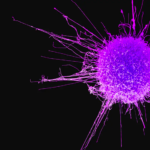Author : Dr. Chandrani Mallik, Consultant- Medical Oncology, HCG EKO Cancer Centre, Kolkata
India
healthysoch
New Delhi, December 02, 2020 :
Lung Cancer is probably one of the few cancers where treatment has undergone a radical change in the past 100 years. Initially, lung cancer was considered a rare entity, and no effort was directed for its early diagnosis or treatment. In 1987 lung cancer surpassed breast cancer as the leading cause of mortality in women. Despite early advances in platin based chemotherapy, success against lung cancer plateaued till early 2000. Then came the approved use of the drug pemetrexed by the FDA which caused a paradigm shift in the medical management of lung cancers.
It has been quite challenging to demonstrate significant improvements in survival for patients with Non—Small-cell lung cancer over the past decade, but targeted therapies such as epidermal growth factor receptor inhibitors and angiogenesis inhibitors have been associated with benefits sufficient to alter our treatment standards. Lung cancer was the first solid tumor to be treated with novel targeted therapy. These therapies have been targeted against specific receptors.
In addition to variations within these classes and combinations of such agents, several novel targeted therapy strategies have been introduced and are now emerging with encouraging results in early clinical trials for patients. Targeted cancer therapies are drugs or other substances that block the growth and spread of cancer by interfering with specific molecules (molecular targets) that are involved in the growth, progression, and spread of cancer.
Immunotherapy is a form of cancer treatment that uses the power of the body’s immune system to prevent, control, and eliminate cancer. From the preventive vaccine for cervical and liver cancer to the first therapy ever proven to extend the lives of patients with metastatic melanoma, immunology has already led to major treatment breakthroughs for many cancers. Every cancer type is unique, though, and immunology and immunotherapy are impacting each cancer in different ways.
Targeted therapies are addressed through only one approach. It is to identify potential targets is to compare the amounts of individual proteins in cancer cells with those in normal cells. Proteins that are present in cancer cells but not normal cells or that are more abundant in cancer cells would be potential targets, especially if they are known to be involved in cell growth or survival. Targeted therapies differ from standard chemotherapy in several ways: Targeted therapies act on specific molecular targets that are associated with cancer, whereas most standard chemotherapies act on all rapidly dividing normal and cancerous cells.
As we move towards the era of personalized medicine, clinical data indicate the fundamental need to screen lung cancer patients to determine their specific mutational spectrum and thus adjust their treatment accordingly. Understanding the genetic alterations of non-small cell lung cancer leads to tailored therapies and effective patient management by minimizing the burden of adverse events. The development of innovative agents as well as combinational targeted treatments is thoroughly examined to reduce or nullify drug resistance. Novel lung cancer genes and driving mutations that may be used as drug targets are constantly discovered.
In spite of rapid advances of targeted therapy and immunotherapy in recent years, the median disease-free survival for lung cancer patients is still suboptimal and further research is required for accurate diagnosis, subtyping, and immunohisto chemical differentiation to allow more individualized molecular treatment for lung cancer. However, on a positive note, these new treatments have caused a paradigm shift in the treatment of lung cancer and have shown us a ray of hope for a brighter future.
healthysoch







